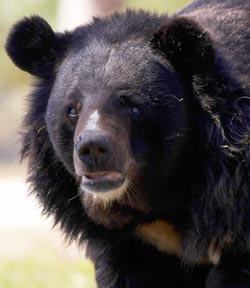Bear attacks tourists in Japan
 The bear was trapped in a souvenir shop, where it was killed |
( BBC )Saturday, 19 September 2009 21:31 UK
An Asian black bear has been shot dead after attacking a group of tourists at a bus station in central Japan.
Four people were seriously injured in the attack in Takayama, Gifu prefecture, according to the Japanese news agency Kyodo.
After the attack, the 1.3m (four foot) bear fled through the bus terminal, and into a souvenir shop.
Employees then trapped it inside the shop, and the bear was later shot dead by officials.

Bite marks
The male bear attacked a group of nine people, mostly tourists, waiting for a bus to take them to the nearby mountains.
According to Kyodo, four men were seriously hurt, with injuries including facial bite marks.
"I saw a man being attacked by the bear," one eyewitness told reporters.
"I tried to help him but the bear kept attacking him. It seemed his face was seriously injured."
An expert on Asian black bears told Kyodo it was unusual for them to attack humans.

No comments:
Post a Comment